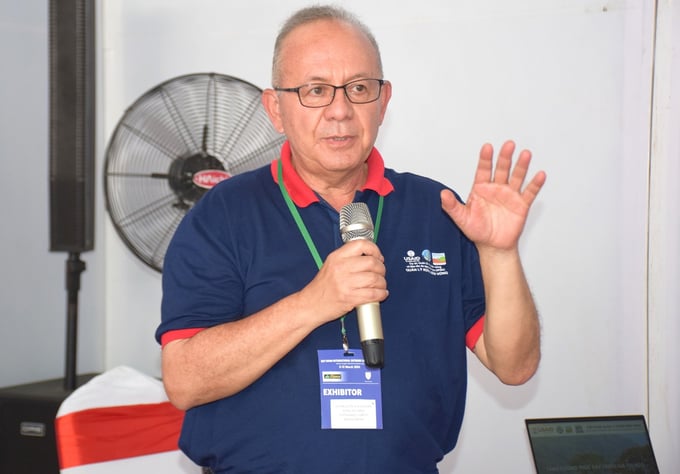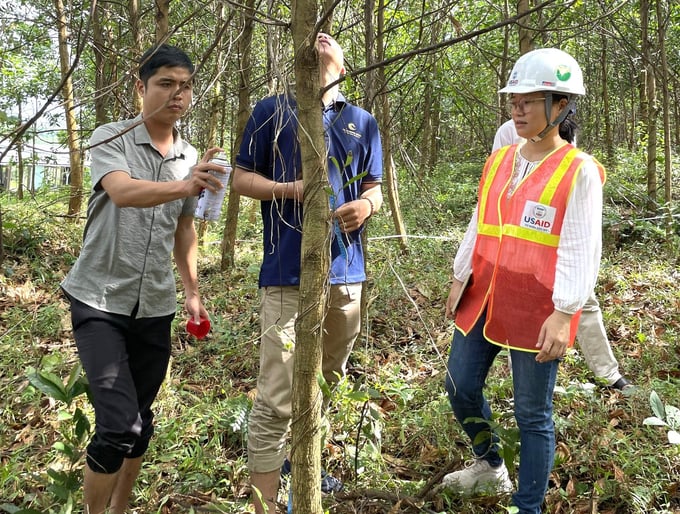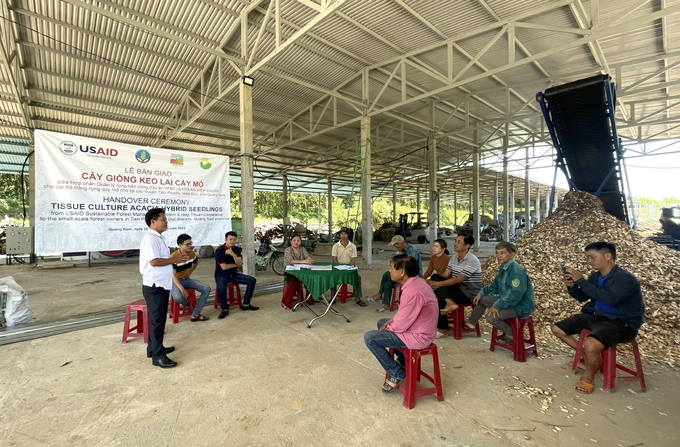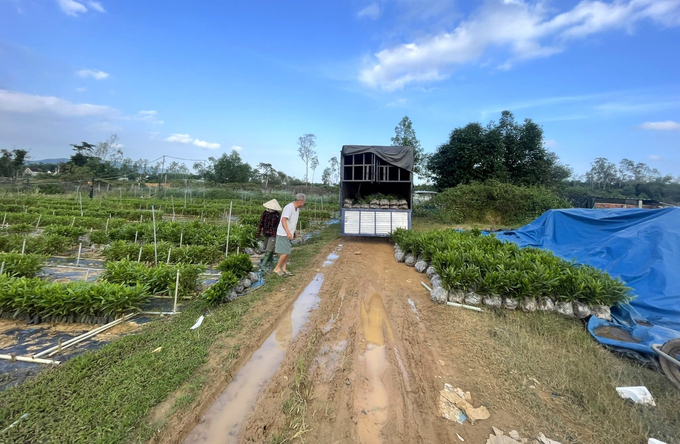June 22, 2025 | 03:40 GMT +7
June 22, 2025 | 03:40 GMT +7
Hotline: 0913.378.918
June 22, 2025 | 03:40 GMT +7
Hotline: 0913.378.918
Vietnam has 14.79 million hectares of forests that can provide ecosystem services, absorb, and store carbon, according to Mr. Abraham Guillen, Director of the Sustainable Forest Management Component (under the Sustainable Forest Management and Biodiversity Conservation Project - VFBC) funded by the United States Agency for International Development (USAID). Nevertheless, the rapid expansion of Vietnam's economy has resulted in a rise in environmental degradation and greenhouse gas emissions.

Mr. Abraham Guillen: The VFBC project helps improve effective forest management capacity for communities; Encourage land and forest allocation to communities. Photo: V.D.T.
Presently, Vietnam's forest cover rate has increased; however, the character and extent of its natural forests are declining. In response to this reality, the Sustainable Forest Management Component of the VFBC project was implemented in Vietnam. This component introduced a variety of approaches to the forests in the seven beneficiary provinces, including Quang Nam, with the objective of reducing the risks associated with forest land-use change, which can result in deforestation or forest degradation.
"The project's specific objective is to enhance the quality, diversity, and productivity of production forests, with a particular emphasis on natural forests; decrease greenhouse gas emissions resulting from the conversion and degradation of natural forests; and enhance carbon sequestration through the effective management of production forests," stated Mr. Abraham Guillen, Director of the Sustainable Forest Management Component.

The VFBC project trains farmers in silvicultural techniques in afforestation. Photo: V.D.T.
Furthermore, Mr. Abraham Guillen reports that forest growers in the project area are being equipped with strategies to improve community capacity for the protection and development of forest resources, as well as to reduce greenhouse gas emissions and establish the groundwork for sustainable livelihood activities and economic expansion. The initiative also fosters private sector involvement and improves the capacity of local authorities and communities to manage forest resources.
Local authorities and forest owners who are beneficiaries of the project are also receiving training in forest management to enhance and replicate community forest management models, enhance forest monitoring and patrolling, establish and implement cooperation and benefit-sharing mechanisms, and promote the allocation of land and forest to communities.
The acacia value chain is supported by the improvement of planted forests from nurseries, the assistance of farmer organizations and stakeholders in obtaining forest certification, and the creation of opportunities for small-scale forest owners to access markets through trade fairs and dialogues.
"The VFBC Project has enhanced sustainable forest management practices to influence the acacia value chain, effectively managing over 141,000 hectares of forest, contributing to the absorption of 5.4 million tons of CO2 emissions, and providing livelihood support to 61,356 individuals." "Silviculture expert of the Central VFBC Project," stated Mr. Nguyen Thanh Tra.
Quang Nam, a province in the Central Coastal region, has a total forest area of over 680,800 hectares, which accounts for approximately 60% of the province's total natural area. Deforestation and forest degradation, which are strictly prohibited by EUDR regulations, are presently posing numerous challenges in Quang Nam, despite its substantial potential in forest resources.

VFBC Quang Nam project hands over seedlings to nurseries. Photo: V.D.T.
The character and value of planted forests are significantly influenced by the quality of seedlings, as stated by Mr. Au Quoc Hieu, Manager of the Quang Nam VFBC Project. Nevertheless, the current state of forestry seedlings in Quang Nam is highly chaotic, as the market is inundated with low-quality seedlings of uncertain origin. This has resulted in ineffective afforestation, low productivity, and poor wood quality. Consequently, the Quang Nam authorities are initiating their intervention in the acacia value chain at the nursery level.
"The quality of planted forests is significantly impacted by the free supply of seedlings of uncertain origin by nursery operators, who are motivated by the low prices to continue purchasing them, " Mr. Au Quoc Hieu stated that the Quang Nam VFBC Project has identified its primary objective as enhancing the quality of forestry seedlings by influencing nursery owners in light of this circumstance.

In 2024, Quang Nam will expand quality forestry seedling nurseries to contribute to the acacia value chain in the area. Photo: V.D.T.
At the inception of the Quang Nam VFBC Project, the primary objective was to enhance the production capacity of forestry nurseries. The initiative has provided 80,000 high-quality parent seedlings to four nurseries in Quang Nam to facilitate the establishment of elite seedling gardens.
"By 2025, the market will receive approximately 25 million high-quality seedlings from these 80,000 parent seedlings, which is equivalent to 12,500 hectares of planted forests." Quang Nam will continue developing high-quality forestry nurseries in 2024 to enhance the local acacia value chain. Additionally, we provide forest producers with high-quality seedlings to establish demonstration models for gradual replication and provide parent seedlings to nurseries. Furthermore, we train farmers on silvicultural techniques for afforestation," stated Mr. Au Quoc Hieu, Manager of the Quang Nam VFBC Project.
Translated by Linh Linh

(VAN) The waste of resources from agricultural by-products and the situation of counterfeit and poor quality goods in production causing losses of thousands of billions were pointed out by the National Assembly deputy.

(VAN) After 5 years of implementation, the CAI initiative has helped coffee growers change their farming practices, moving toward responsible agriculture that meets global export standards.

(VAN) The primary prerequisite for the comprehensive and robust integration of Vietnam's livestock sector into the global value chain is the establishment of a disease control system.

(VAN) The results of national programs are essential for establishing a contemporary livestock sector that is well-equipped to meet the demands of both domestic and international markets, with robust biosafety standards.

(VAN) The UNESCO Global Geopark revalidation of Non nuoc Cao Bang and the transition to a two-tier administrative model are presently undergoing a pivotal moment in Cao Bang, the northernmost province of Vietnam.
/2025/06/13/5330-2-004539_953.jpg)
(VAN) Changing policy mindset and removing investment barriers are urgent requirements to open up new development space for enterprises in the agricultural sector.

(VAN) The areas include the restoration of five million hectares of marine ecosystems.